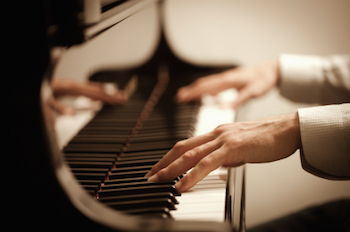We hear it all the time.
“I really want to learn to play the piano (or have my child learn to play the piano). But I’m just not sure how well I’ll do with the lessons. Should I really invest in a piano with so much uncertainty?”
Fear definitely holds us back. Especially when its something out of our comfort zones, like playing the piano. So instead of taking a step forward and doing it, we sit back and worry about the process. In most cases, they are all myths. Have you ever had one of these thoughts hold you back?
“The first few months of lessons are boring, playing notes and chords and classical songs. I don’t know if I can stick with it.”
Most piano teachers today realize their students don’t want to stick with the classical pieces they’ve never heard before. Instead, they concentrate on theory. Yes, you will have to learn the notes and the chords. But when it comes time to choose music, you can find music of all abilities in every genre out there. And in some cases, you’ll learn faster when you recognize the tune instead of picking out the notes simply because they exist on the page. Be sure to talk with a potential teacher before you sign up, and learn their strategies before you make your final selection.
“Children learn faster than adults.”
We hear this all the time from adults that have always wanted to play, but are afraid age will stand in the way. Nothing could be further from the truth. Sure, kids learn in different ways, and in some cases may seem to pick it up faster. But adults have a lot of advantages too. Adults are more aware of a wide variety of songs, and in some cases find it easier to play because they hear it. Adults also tend to have better aptitude to commit to regular practice. Because they’ve wanted piano in their lives, they are more likely to make it fit into their schedules, rather than be “forced” to practice on a regular basis. Adults can become more easily frustrated, however, and this is something you need to work with as you find a good teacher. Self-judgement and stress can easily come into play if you feel you aren’t picking things up quickly, or if you don’t sound like the concerts you attend at your local symphony. A good teacher will help you put your expectations into perspective, and help keep you on track.
“Piano lessons will be stressful. If I don’t keep up with expectations, my teacher will drop me.”
I think many of us remember the stress of being in school, with daily homework and tests to ensure you were doing things on time. Piano lessons aren’t like that. If you choose a piano teacher that works with adults regularly, they understand that things come up in our lives that prevent us from doing all we had planned. They understand if you don’t pick up things quite as quickly as expected. They adjust. A great piano teacher takes all this into consideration, and helps you through the lesson in a way that will benefit you the most. Maybe you need more work on chords, hand movement or eye position. Maybe you need a couple of weeks mastering the same tune. Piano playing is very personal by nature; a teacher’s job is to ensure you have fun and understand the concepts before moving on, no matter how long that takes.
“I must practice every day.”
Very few things make it into our lives every day. In fact, for many things, a daily routine can not only get monotonous, it can also make it less effective. Think of a workout routine. You would never lift weights in the same way day after day, right? Instead, you create a routine where you use weights several times a week, skipping days in between. You change things up. That’s to help your body recover, and for your mind to be present when you spend the time in the gym. Piano lessons work in a similar way. Rather than rushing in and playing for 10 minutes a day because you have to, if you spend 20 minutes every other day because you have the time and enjoy it, it will be much more meaningful to you. The key is to fit it into your schedule and be present.

